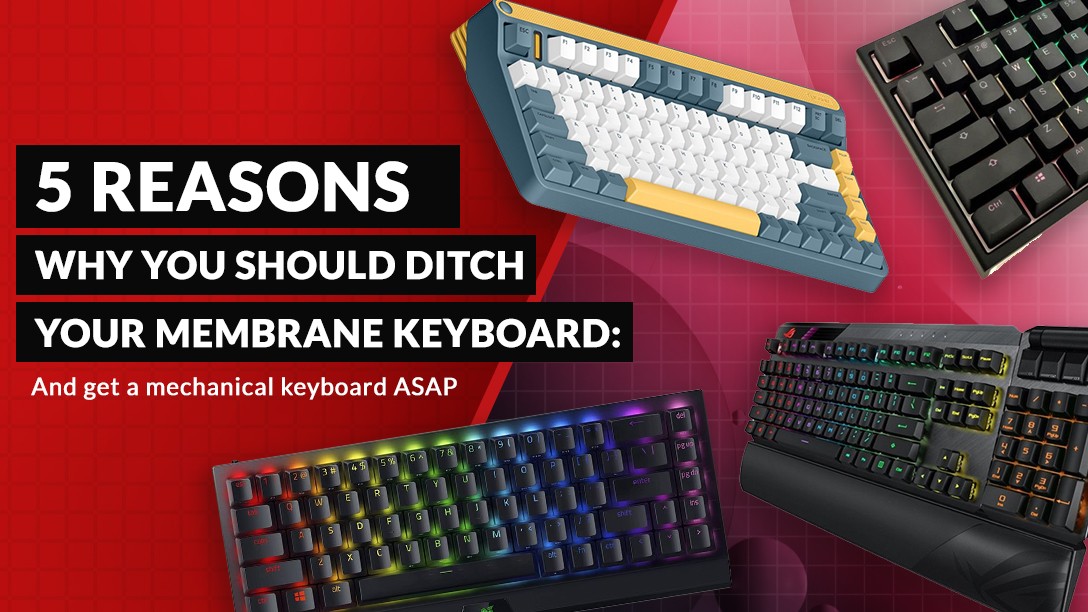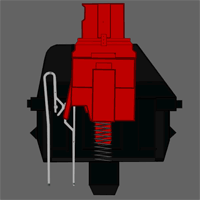

Mechanical Keyboard - what’s all the rage? Why do people who you know keep on urging you to get one? Why did they say that a membrane keyboard that you got for a lesser price isn’t that good?
If you currently have these questions, you’re not alone. We have encountered many-a people who have asked the very same questions. But we’re here to explain it to you.
In all honesty, there’s nothing wrong with the membrane keyboard. They're cheap, light, and portable. It’s a viable option if you don’t use a keyboard that much and only want one in case you need it. However, if you want to be able to type faster, have a reliable tool, and overall improve your typing experience, we highly encourage you to try mechanical keyboards.
Before we further discuss how a mechanical keyboard can impact your life, let’s differentiate it from a membrane keyboard.
MEMBRANE KEYBOARD - This is your average keyboard. Usually, they’re a freebie for PC builds or laptops (rarely). These keyboards work by using a single sheet of rubbery layer instead of separate keys that make contact with the circuit board when fully pressed.

Keyboard construction, in four layers. Image via Wikimedia Commons
MECHANICAL KEYBOARD - This keyboard, on the other hand, has switches underneath each key. The switches of a mechanical keyboard are made from different parts: stem, spring, housing, and contact leaves. When you press a key, the stem pushes the spring down making the contact leaves connect, registering your keypress to the circuit board and therefore to your computer.
Here’s how it works:

Mechanical Switch. Image by William Judd via KeyboardCo
Aside from the usual, there are other types of mechanical switches that you might encounter: optical and low-profile switches.
Optical switches almost have the same inner working as your average mechanical switch but instead, it uses light to register each key press. Depending on the type of optical switch, it works either by blocking or letting the light pass every time you press on it. And because it uses light, you’ll find that it operates faster than the average mechanical switch.

Optical Switch. Image by Razer
Low-profile mechanical switches, on the other hand, are just mini mechanical switches. It has the same parts mentioned above but the difference is it has a smaller body and a shortened stem height. With these qualities, it also functions relatively faster compared with high-profile mechanical switches.

Low-profile switch. Image by Cherry
You might have also encountered the term mecha-membrane keyboard in one of your searches. Don’t be fooled. Despite the name, it only delivers a “mechanical switch feel” (usually, this means the combination of clicky sound and tactile feel that people thought is representative of the sound and feel of all mechanical keyboards). But through and through the mecha-membrane keyboard is still classified as a membrane keyboard because inside, it's still composed of a membrane sheet and collapsible domes.

Mecha-membrane switch. Image by Razer
All these terms might have confused you but don’t worry. For our purpose, we’ll stick to the dichotomy of mechanical and membrane keyboard only.
You didn’t expect that, did you? The main “turn off” -as people say- is the price gap between the membrane and mechanical keyboard. People would argue that one (1) mechanical keyboard easily equates to 2-3 membrane keyboards. While it’s true that a mechanical keyboard is indeed on the pricier side, it’s well worth every penny because it can easily outlast a membrane keyboard.
Membrane keyboards are usually cheap, as mentioned earlier. They are mass-produced and manufactured with low-cost materials. The common complaint against this type of keyboard is that it doesn't even last a year. And it’s not exactly fix-it-yourself friendly so you’ll often find yourself thinking “buying another one is less of a hassle than trying to fix it”. So, imagine how much you're spending when you keep buying a membrane keyboard every 3 - 6 months.
In addition, the membrane keyboard lasts 5M keypresses, on average. If you look at that number, it looks like a decent amount of typing. But when you compare it to the mechanical keyboard that lasts 50M keypresses each key, 5M doesn’t look that impressive. Another kicker here is that depending on the switch and how it was engineered, each mechanical switch can reach up to 100M keypresses just like the ones installed in SteelSeries Apex Pro Mechanical Keyboard.
Because of how a mechanical keyboard is built and functions, it can last you more or less 5 years. And even if the switches die out, you can replace them (but it still depends on how the switches are installed).
Granted, it all boils down to how you'll abuse or take care of your keyboard. Just don’t dunk it in water if it’s not waterproof, clean it regularly, and generally take care of it. Still, you’ll be with a mechanical keyboard much longer than a membrane keyboard.
Aside from the disparity in lifespan, you’ll find that mechanical keyboards are more reliable in terms of registering your input. As briefly mentioned earlier, the membrane keyboard essentially consists of a rubber layer and the membrane layer (sometimes, more than that but let’s keep it simple). In order for your keypress to be recognized, the rubber sheet layer must have full contact with the membrane layer. Let’s emphasize the last part: full contact. Because if it doesn’t, then consider whatever it is that you’re typing incomplete or worse, none-existent. People call it ghosting. It gets frustrating whenever it happens. You lose concentration everytime you need to backtrack, delete, and edit some words. Most likely you learned to slow down typing and this negatively impacts your productivity.
On the other hand, a mechanical keyboard has mechanical switches per key. So this means that the keystrokes are registered separately and can be handled simultaneously. This keyboard ability is also known as rollover. Mechanical keyboards have a minimum of 6KRO (press 6 keys simultaneously and all will be registered just fine). Meanwhile, specialized mechanical keyboards (mostly made for gaming) have NKRO which means each keypress is correctly detected no matter how many keys you press or hold at the same time.
In support of this feature, mechanical switches don’t require you to bottom-out or fully press the key for the system to recognize your input. The switches send signals to your system once you reach the actuation point.
The combination of these two is the perfect recipe for a reliable performance. You’ll be able to type faster on a mechanical keyboard than a membrane keyboard.
If unreliability isn’t enough to kill your productivity, then the membrane keyboard will hit you with another bummer: how it feels. When a membrane keyboard is new, the plastic layer inside is still soft causing it to feel mushy. After some time, the plastic becomes stiff making it hard to type on. Either way, it doesn’t spark creativity and productivity, doesn't it?
On the other hand , you can choose how you want your mechanical keyboard to feel and sound. You see, there are three main classifications of mechanical switches: Linear, Clicky, and Tactile. And the common colors attributed to these switches are red, blue, and brown respectively.

Linear, Tactile, Clicky Switches Comparison. Image by SteelSeries
If you want your keypresses to feel as smooth as butter and you want to work fairly in silence, get a mechanical keyboard with linear switches.
Want to go on an entirely different route because you’re tired of your membrane keyboard that doesn’t have any sound or feel to it? Definitely go for a mechanical keyboard with clicky switches. It produces loud and audible clicks and you feel a resistance every time you press on it. This type of keyboard can make you feel satisfied as if you’ve done a lot due to it’s audible and tactile feedback.
But if you prefer the balance between the two, then consider a mechanical keyboard with tactile switches. Tactile switches are relatively silent like linear switches but it has a resistance just like clicky switches. If you’re a complete newbie to mechanical keyboards, we suggest starting with this one.
What if you have commitment issues? We’re not attacking you, chill! But did you know that there are certain mechanical keyboards that enable you to swap out switches? They are called hot-swappable mechanical keyboards. With this nifty feature, you don’t have to stick with only one type of switch for your whole life! It’s helpful whenever you want to try out other switches or you simply changed your preferences as you dive deeper into the mechanical keyboard hole. This is something a membrane keyboard cannot offer.
Look how easy it is:
Hot-swapping switches. Image by SiliconZ
If you’re interested, here are some of the available hot-swappable keyboards:
What we love about mechanical keyboards is you can buy or build one that suits your needs.
Do you encode numbers most of your days? Then, get yourself a full mechanical keyboard - complete with the navigation keys, numpad keys, directional keys keys, and f-row.
What if you don’t need the numpad and you don’t have that much space in your desk? Well, a tenkeyless (TKL) might be a better fit for you
Still too big? Do you wish you could get something smaller that makes your desk look clean and you can potentially take anywhere? Consider a mini/compact 60% mechanical keyboard.
Oh you fancy the compact layout but cannot live without the directional keys? We suggest looking into 65%, 70%, and the likes.
See? Whatever lifestyle you may have, a mechanical keyboard fits right in.
There are plenty more mechanical keyboard layouts in the market! But the layouts we mentioned are the commonly and readily available ones. You wouldn’t find this much variety in membrane keyboards.
This is one of the main features of a mechanical keyboard that you thought you wouldn't need. But once you have it, you'll never be able to want a membrane keyboard. This also backs up the idea that you can build or buy a mechanical keyboard depending on your preference and needs.
Mechanical keyboards provide a lot of personalization opportunities, with a few offering more than others. One of the basics is choosing or trying out mechanical switches. As mentioned earlier, you can choose whichever switch type you prefer on your keyboard and sometimes, you can try out other mechanical switches as you go!
Another is keycap replacement. Most membrane keyboard sports neutral colors only like black or white. If you want a specific color, you may not be able to spot one in the wild so luckily. Plus, if you just want to try to change specific keys, you cannot do so willy-nilly.
Meanwhile, if you’re bored with the current color of your mechanical keyboard, you can purchase a supplement keycap set like these:
Or you can replace all of the keycaps of your mechanical keyboard and completely change its look and vibe. Just look at how varied the keycap sets in the market:
Just make sure that the mechanical keyboard you get comes with mechanical switches that have cross-axis stems and you’re good to go. You can also mix and match colors that do not belong in the same set so long as they have similar height profiles. No one can stop you.
Next is backlighting. Granted, there are membrane keyboards that have a backlighting but they are quite rare unlike in the mechanical keyboard realm where most of the starter options already have LED lighting. If you’re wondering if this also adds to the price, the answer is…yes. However, it really depends if you would need it.
Why would you buy a keyboard with backlighting? Aside from it being fun and mesmerizing to look at, it's also functional. It enables you to work in the dark. When you work in a dimly-lit room, the backlighting will be your visual guide so you know that you’re placing your fingers on the correct letters.
![Keychron K2 V2 84-Key White Backlight Wireless Mechanical Keyboard Hot Swappable K2A1H [Red]](https://gameone.ph/media/catalog/product/cache/7a2235b416a1900151232a782f707140/k/e/keychron-k2-v2-red-.jpeg) |
![RK Royal Kludge RK68 Plus (RK871) Tri-Mode RGB Mechanical Keyboard - White [Brown]](https://gameone.ph/media/catalog/product/cache/7a2235b416a1900151232a782f707140/r/k/rk-g68-white-brown_2.jpg) |
![Redragon K552 Kumara TKL Mechanical Gaming Keyboard [Blue]](https://gameone.ph/media/catalog/product/cache/7a2235b416a1900151232a782f707140/r/e/redragon-k552-kumara-red-led-1.jpg) |
![SteelSeries Apex M650 Gaming Keyboard [Blue]](https://gameone.ph/media/catalog/product/cache/7a2235b416a1900151232a782f707140/1/_/1_4_14.jpg) |
| Keychron K2 V2 84-Key White Backlight Wireless Mechanical Keyboard Hot Swappable K2A1H [Red] | RK Royal Kludge RK68 Plus (RK871) Tri-Mode RGB Mechanical Keyboard - White [Brown] | Redragon K552 Kumara TKL Mechanical Gaming Keyboard [Blue] | SteelSeries Apex M650 Gaming Keyboard [Blue] |
| White LED | RGB LED | Red LED | RGB LED |
| P 4,295.00 | P 2,295.00 | P 1,695.00 | P 6,995.00 |
| Add to Cart | Add to Cart | Add to Cart | Add to Cart |
But if you’re someone who has memorized their keyboard and feels that the lighting is unnecessary, by all means, pick a non-backlit keyboard like one of these:
Or you can get a budget option that comes with RGB lighting and turn it on or off whenever it strikes you.
Oh and if you thought that’s it…NOT. There are other customization you can do like choosing the type of frame (plastic, aluminum, wood), switch plate (polycarbonate or brass), stabilizer (clip-in or screw-in), and even the cable of your mechanical keyboard (given that the keyboard has a detachable USB-C connection)! There’s many more we won’t be delving into deeper for now because it can get complicated. But just know that there are heaps of possibilities when it comes to mechanical keyboards.
In case you want inspiration to own a mechanical keyboard, just go over to Facebook groups, online forums, and the likes. You’ll see how crazy, artful, or modern a mechanical keyboard can be.
Furthermore, if you need help or suggestions, the community experts can easily provide you answers and point you to sources that you'll need. It’s an avenue to make friends, show off your keyboard build, and just generally join in on discussions.
So all in all, why should you ditch your membrane keyboard and get a mechanical keyboard ASAP? It’s because mechanical keyboards are more economical, reliable, satisfying to type on, personalized, and customizable.
Granted, it can be expensive. But the keyword here is “can be” because it doesn’t have to be and it comes down to your perspective! There are many contributing factors to the price such as the brand name, materials in the build, additional features, and customization options. Despite that, there are budget options from brands like Aula, Royal Kludge, Tecware, and Redragon. These brands offer mechanical keyboards with plenty of features at a fraction of the price offered by other well-known brands.
Price talk aside, think of it this way: Keyboard is the tactile connection to your computer. It’s one of the main avenues in which you’re able to translate what you want to accomplish on your computer or laptop. So it makes sense that you want this tool to function well. You'd want something that helps you rather than impedes you from doing what you want: be it productive, entertaining, or gaming. It’s the same concept why you get a faster laptop, larger screen monitor, or newer cell phone – it’s because you want to maximize their use despite the price. Think of it as investing in yourself as well.
Do you know what’s the only downside in owning a mechanical keyboard? Once you try it, you can never go back.